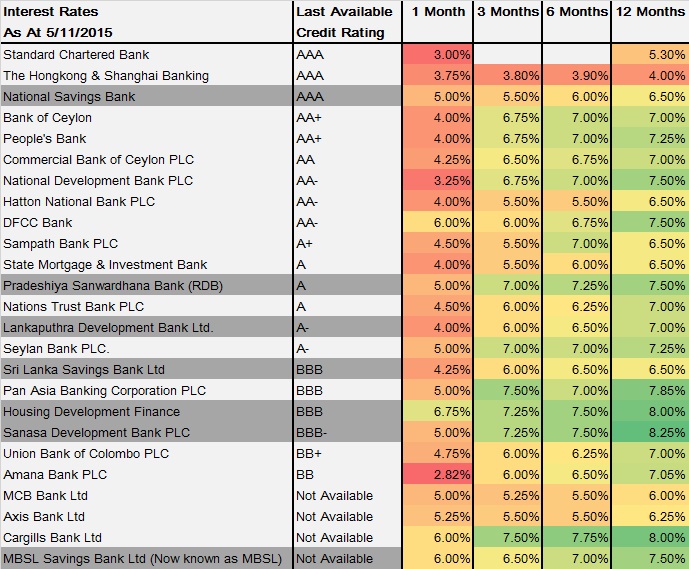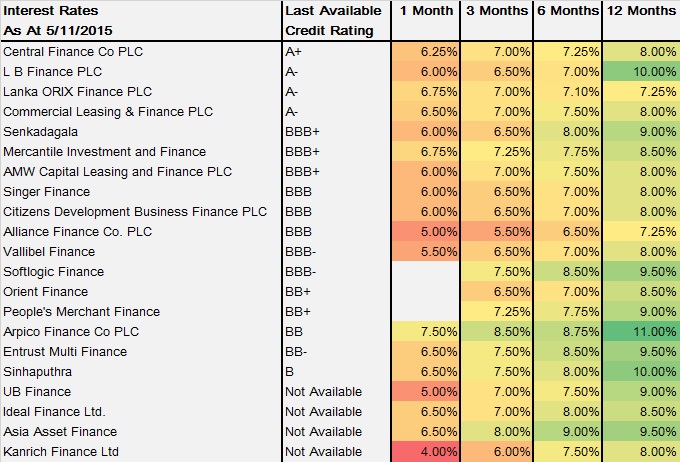A recent report by a Leading Banking Group in the US found that nearly 50% of all households in the United States save no money at all. The US Department of Commerce statistics point out that overall, Americans save only about 5% of their income. Most of their savings are either in a personal savings account which actually pays under 1% per annum or it is in a retirement fund linked to the stock market.
Here in Sri Lanka the Household saving ratio was estimated to be 21.1% in 2014.Which means that the average Sri Lanka saves about this much from his/her monthly income every month. Most of this money is held in a savings account or as a fixed deposit. While, it’s estimated the country has over 700,000 registered CDS accounts which are used to invest in the stock market only around 10,000 investors actually use these accounts on a regular basis.
While I will write something on the stock market and how to pick out stocks in the CSE in a later article this one sets out some information regarding deposits in banks and financial institutes.
What are these institutes?
The Central Bank of Sri Lanka mainly licenses three types of organizations to take public deposits.
Licensed Commercial Banks (LCB) and Licensed Specialized Banks (LSB) are considered to be more stable and are very important to the overall system ;therefore they are very strictly monitored and regulated. Licensed Finance Companies (LFC) are also under strict vigilance by CBSL yet are smaller fry compared to the larger scheme of things. Collectively these three types of institutions held about LKR 5100 billion of cash as at December 2014. That money provided by depositors accounted for about 42% of total assets in the financial sector. To put it simply, 42% of the financial system in the country ran on the public’s money.
However, “a fool and his money are soon parted” is a proverb that keeps finding a proving ground in Sri Lanka. Most people are easily fooled by promises of returns that are too good to be true, and in most cases they are. Therefore one of the best ways to not lose your money is to always deposit it at ‘Licensed’ Banks or Finance companies.
Is your money safe at any of these places?
CBSL operates a Deposit Insurance scheme where in the event the license or registration of a member institution (which is an approved LCB, LSB or LFC) is suspended or cancelled by the Monetary Board, depositors will be compensated up to a maximum of LKR 300,000 per depositor.
How do you know which ones are safe?
Theoretically anything under LKR 300,000 should be safe doesn’t matter where you’ve parked it as long as it’s an approved entity. But one of the best ways of finding out the relative strength of a financial institute is to look into its Credit Rating.
What is a Credit Rating?
A credit rating is an evaluation of the credit worthiness of a debtor, in this case the Bank or Finance company which has borrowed your money. A Credit Rating agency provides an opinion on the Institution’s ability to pay back its obligations by looking at available information. A Credit Rating can be used as a guide to find which institutions are stronger compared to the others in the market.
The symbols are quite easy to grasp. More A’s are always better, and more B’s are preferred to less B’s. Plus is a sign indicating a notch higher in the ladder. Therefore a B+ is stronger than a B or a B-.
I’ve collated the Credit Rating and the deposit interest rates of some of the approved deposit takers in Sri Lanka below. For the full list approved by CBSL visit here
You’d notice that most of the interest rates are correlated to the Credit Rating of the institution. This is because a better rating essentially translates to lesser risk and thereby investors are provided with less reward.
The rates below are for normal fixed deposits (senior citizen rates are usually higher) with interest paid at maturity. Note that some companies offer higher interest on regular savings than on one month FD’s. The higher rate has been added in those cases. (eg; DFCC Bank).
This is a list of Banks

The Licensed Specialized Banks are in Dark Grey. LSB’s are a remnant of historic economic thinking which championed that separate banks were needed for different causes such as savings, industrial development, rural development, etc. These days everybody does (almost) everything.
This is a non-exhaustive list of Finance Companies
